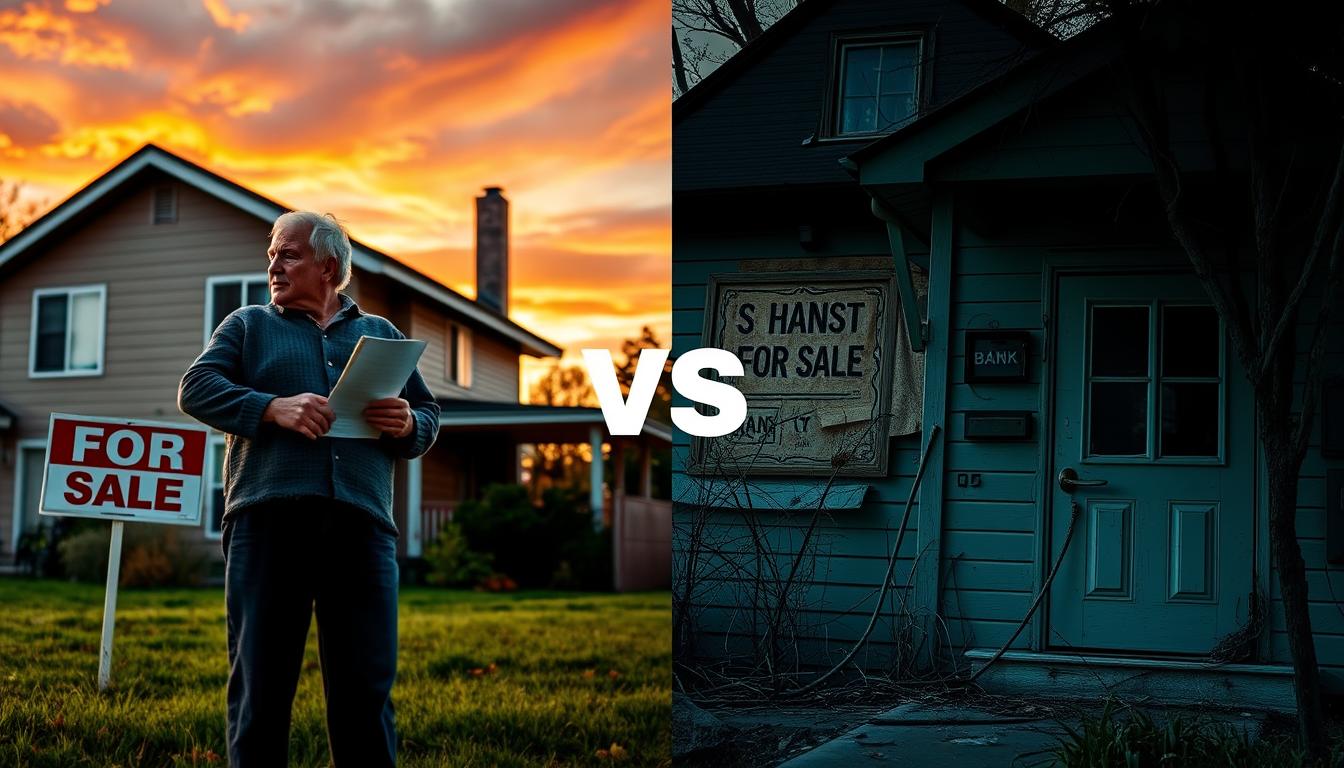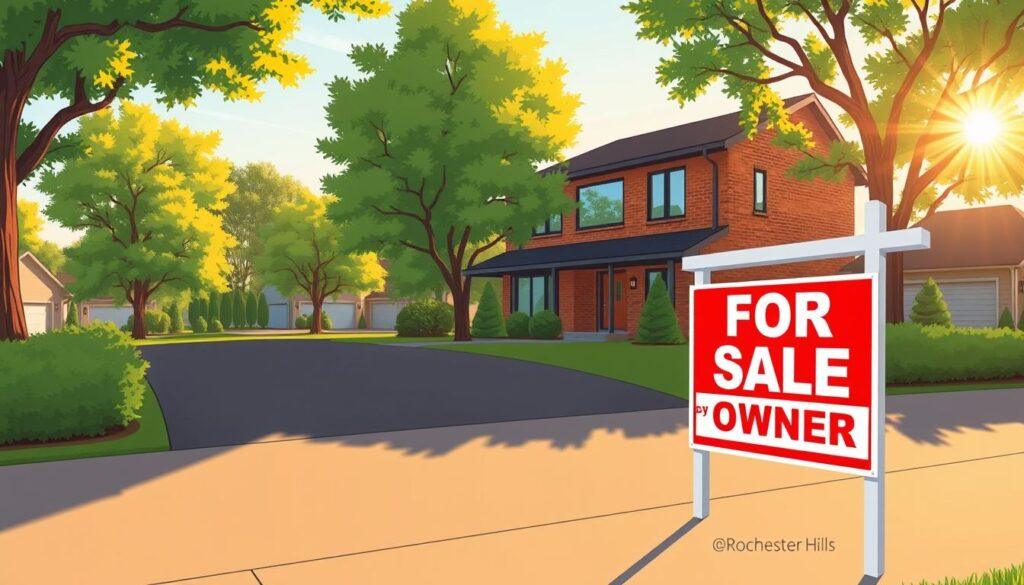Ever wondered what happens in a short sale versus a foreclosure? Many homeowners face these tough choices but don’t know the details. It’s key to understand the differences, especially how they affect your credit and future homes.
A short sale means selling your home for less than the mortgage, with lender approval. Foreclosure happens when a lender takes back the property for missed payments. Knowing the pros and cons of each is crucial. This article will help you make better choices.
Key Takeaways
- The foreclosure process starts 3-6 months after the first missed payment.
- A short sale can take about the same time but often helps homeowners more.
- Foreclosure can hurt your credit score by 200 to 400 points.
- After foreclosure, you might wait a long time to buy another home.
- Buying short sale or foreclosed properties has different financial benefits.
- Doing a short sale might let you buy a new home sooner under certain conditions.
Understanding Short Sales
For homeowners facing financial challenges, knowing the short sale process is key. A short sale happens when a house sells for less than the mortgage debt. This requires the lender’s okay, unlike a forced foreclosure. Understanding what is a short sale helps homeowners find their way during tough times.
What is a Short Sale?
A short sale means selling a house for less than the mortgage debt. This usually happens when house prices drop. For example, if a house is worth $250,000 but the mortgage is $300,000, there’s a $50,000 gap. Knowing this helps people make smart choices when money is tight.
Reasons for a Short Sale
There are many reasons for a short sale. Common reasons for short sale include:
- Financial hardship due to job loss
- Medical expenses that strain finances
- Unexpected changes in family circumstances, such as divorce
- Market downturns resulting in decreased property values
Each reason can be very stressful. Short sales offer a way out of traditional foreclosures.
Short Sale Process Overview
The short sale process has several steps and can take months. Here’s a quick look:
- Assess property value and financial situation
- Engage a real estate agent with short sale experience
- List the property for sale, ideally at a price acceptable to the lender
- Submit a short sale request to the lender, including financial documents
- Negotiate with potential buyers and the lender
- Once approved, close the sale
This process might seem simple, but it can be long and stressful. Knowing each step helps prepare homeowners for the journey.
Understanding Foreclosures
Foreclosure is a serious issue for homeowners. It happens when a lender takes a property because the homeowner can’t pay their mortgage. Knowing about foreclosure is key for those dealing with real estate and mortgages.
What is Foreclosure?
Foreclosure starts when homeowners miss mortgage payments. After a few months, the lender can sell the property to get back the money owed. This usually takes 3 to 6 months, depending on the state and lender rules.
Foreclosed homes are often sold for much less, about 67.7% off the market price.
The Foreclosure Process Explained
The foreclosure process involves several legal steps. First, the lender sends a notice of default to the homeowner. If the homeowner doesn’t fix the issue, the lender may hold a public auction to sell the property.
This auction happens after 120 days from the initial notice. Foreclosures are often faster than short sales, closing in a few months. This can be good for buyers who want quick deals.

Consequences of Foreclosure on Homeowners
Foreclosure can have lasting effects. Homeowners may see their credit score drop by 100 points or more. This makes it hard to get loans in the future.
The foreclosure stays on credit reports for seven years. This is why understanding foreclosure consequences is crucial. For those at risk, learning about short sales and foreclosures can be helpful. More information is available here.
Short Sale vs Foreclosure: Key Differences Explained
Short sales and foreclosures both affect homeowners in big ways. Knowing the differences helps make better choices. We’ll look at how they impact credit scores and financial duties after each process.
Impact on Credit Scores
The impact on credit scores is different for short sales and foreclosures. Foreclosures can drop scores by 200 to 400 points. This big drop makes it hard to borrow money later. On the other hand, short sales might only lower scores by 50 to 150 points. So, short sales seem less harmful to credit scores.
Financial Responsibilities After Sale
Homeowners need to understand the financial duties of each choice. Foreclosures can leave homeowners owing money on their mortgage. This means they might still have to pay even after losing their home. Short sales, however, might let homeowners negotiate to forgive some debt. This can be a better option than the ongoing debts of foreclosure.
Advantages of Choosing a Short Sale
Sellers with financial troubles might find a short sale helpful. It lets them control the sale better and can offer better prices than foreclosure. Knowing the short sale advantages helps sellers make smart choices about their money.
Benefits for Sellers
Choosing a short sale has many benefits for sellers:
- More control over the sale.
- Chance to talk terms with the lender.
- Shorter time on the market than regular sales.
- Homes sold this way usually stay in better shape.
- Less risk of being sued for money owed on the house.
Less Impact on Credit
Homeowners worry about how financial troubles affect their credit. A short sale can hurt credit less than foreclosure. Here’s why:
- Foreclosure can hurt your credit for up to seven years.
- A short sale might hurt your credit less, helping you recover faster.
- You might be able to buy a home again sooner after a short sale.
Choosing a short sale over foreclosure can protect your credit more. For more on the differences, check out this helpful guide.

Potential Drawbacks of Foreclosure
Foreclosure can have big problems for homeowners, both money-wise and when buying new homes. Knowing these issues helps people deal with the tough times in real estate, especially when facing foreclosure.
Negative Financial Consequences
Foreclosure hits homeowners hard, both financially and in credit scores. Credit scores can drop by 100 points or more. This makes it hard to get loans in the future and raises interest rates.
Homeowners might also face deficiency judgments. This means lenders can still go after them for money owed after the house is sold. It adds to their financial troubles.
Challenges in the Purchasing Process
Buying a foreclosed home comes with big challenges. These homes often sell for 35% less than they could. But, they come with risks.
These homes might be in bad shape because the previous owners couldn’t pay for upkeep. Buyers need cash and face long approval times. They also worry about unpaid taxes or liens on the property.
| Aspect | Short Sale | Foreclosure |
|---|---|---|
| Averaged Price Reduction | 5-15% below market value | 35% below market value |
| Credit Score Impact | Moderate | Severe (100+ point drop) |
| Time Required for Process | 4-6 months or longer | Often quicker, but varies |
| Potential Buyer Financing Issues | Common | Cash often preferred |
| Title Issues | Potentially less complex | Often messy title histories |
Knowing these things helps buyers and sellers make smart choices in real estate. For more on short sales versus foreclosures, check out this link.
Conclusion
When it comes to short sale vs foreclosure, knowing the differences is key for homeowners in trouble. Both options deal with financial hardship, but they affect credit scores and future home buying differently. Foreclosures can drop credit scores by 200 to 400 points, making it hard to get a new mortgage for up to seven years.
On the other hand, short sales only lower credit scores by 50 to 130 points. This allows homeowners to buy a new home in as little as two years. Short sales also mean homes are often better kept than foreclosed ones, making the buying process smoother.
Getting help from real estate experts, like Four 19 Properties, is crucial. They help decide between a short sale and foreclosure. This advice is key to making smart financial choices.
Homeowners facing short sales or foreclosures need to act fast. Talking to experts can show the benefits of short sales in reducing financial and credit harm. Knowing these differences helps homeowners take charge of their finances and work towards recovery.






